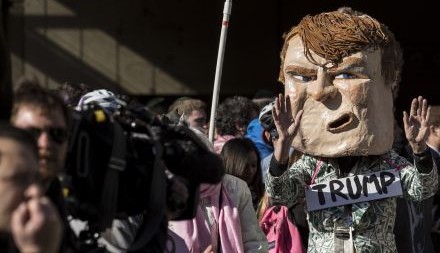PHOTO: Mexicans with an effigy of Donald Trump, March 2016
Adam Quinn of Political WorldView and the University of Birmingham writes for The Conversation:
Chatham House’s new report on elite perceptions of the US in Latin America and the post-Soviet states – which follows a previous survey of Asia and Europe – underlines the uniquely daunting task of expectation management that awaits anyone in charge of America’s image in the world.
It’s tricky to ask other countries to be realistic about the US’s national interests without pushing them into disillusion and resentment. Small wonder then that those consulted for the report say they’re more cheerfully disposed to Americans outside government than they are towards agents of the American state, who have no choice but to confront the hard cases.
Underlying the critiques offered by respondents, one can make out the same perceived American qualities about which those on the receiving end of US foreign and economic policy have complained for generations: presumptuousness, overconfidence in how much they know, a degree of obliviousness. And naturally, the respondents make clear that history casts a long shadow over the US’s image in both regions.
Many decades of quasi-imperial US intervention in its southern neighbors’ politics – sometimes calculated, sometimes blundering – has understandably made Latin Americans intensely sensitive to this sort of thing. Those from the former USSR, especially Russians, seem to have followed a journey from naive Soviet-era curiosity about the US to disappointment at the reality of it.
Western-leaning people and states in the post-Soviet sphere now regard the US as an inconstant ally on whom one would be ill-advised to bet everything. At the same time, Russia’s leadership and those in its political orbit have started to slip back into some old Cold War ways, which have played out visibly in the Ukrainian and Syrian conflicts.
Along with disappointment, the report’s respondents level a longstanding charge against America: hypocrisy. Besides the highly checkered history of US interventionism, the report’s respondents are well aware of the US’ contemporary domestic shortcomings, including racial division, police violence and social inequality, which undermine its standing as an exemplar.
Casting the First Stone
One can imagine mixed reactions among Americans who read the report. On the one hand, few informed people among them will be shocked by the news that their country has some shady interventionist episodes lurking in its past, or that its domestic conflicts look ugly when projected on a screen for the globe to see.
On the other hand, it’s hard to imagine many being eager to take notes on civil and political shortcomings from Brazil, Venezuela or Cuba, or criticisms of self-interested cynicism from the Russian elite and their post-Soviet neighbors.
This speaks to a key point that also gets a prominent mention in the report: that the US is often held to a higher standard than any other country.
When American intervention in a conflict fails to secure a final resolution – or worse, when Washington simply pursues its own interests rather than serving as a neutral arbiter – it seems to provoke a sense of entitled disappointment in those “let down” that other countries rarely encounter.
This is partly its own doing, thanks to its leaders’ fondness for “American exceptionalism” and the grandiose idealistic rhetoric that sometimes goes with it. It’s also a function of American power: any state that has played a major role in shaping the internal politics of so many other places is liable to be ascribed a sort of God-like omnipotence, rather than judged as just another country with its own interests to pursue.

Protest in Pakistan against US drone strikes (Arshad Arbab/EPA)
The report suggests that US leaders might mitigate this problem by taking a more “nuanced” approach to presenting and promoting their country. It also notes that it might help to “build awareness” among the world’s elites of the realities of “the US political system and its limits”.
This could help remedy the all-too-common exclusive focus on the presidency at the expense of the full complexity of American government. Such focus gives outsiders a myopic view, and can fuel the perception that the US is deliberately mendacious or unreliable when in fact it’s often simply bogged down by acrimonious or deadlocked domestic rivalries – a phenomenon familiar to almost every country on the planet.
That foreign elites’ limited grasp of American politics should present as a serious problem for the US’s image is of course an irony, given that foreigners often criticize US leaders for ignorance about other countries. But diplomacy is, perhaps, the business of letting such minor hypocrisies slide.
A final point worth highlighting is that notionally “domestic” issues (such as immigration policy) can clearly affect American relations with other countries. This year’s Presidential campaign has seen the most inflammatory rhetoric on that issue in generations, with Latin Americans in particular bearing the brunt of verbal assaults from Donald Trump and his nativist supporters.
This reminds us that it’s not just overseas actions that affect the US’s international reputation: the way people of other nationalities are discussed within America’s domestic political discourse reverberates around the world.
When a country – and in particular a superpower – has opted for so long to define itself by reference to liberal values, any perceived betrayal of them is all the costlier to its image. This will remain a challenge no matter who wins the coming election.


